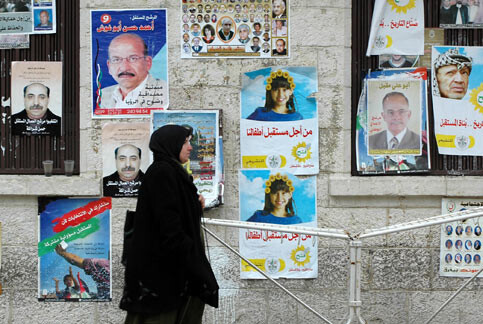Palestinian Center for Human Rights 17 January 2006

Posters of different electoral lists running for the Palestinian Legislative Elections are stuck in the streets at the West Bank town of Ramallah January 4, 2006. (MAANnews/Charlotte de Bellabre)
Israeli Occupation Forces (IOF) have imposed additional restrictions on the movement of Palestinian civilians in the West Bank. Since the beginning of this year, IOF have separated the north of the West Bank from other Palestinian communities. These measures have coincided with the initiation of the campaigns for Palestinian parliamentary elections.
Since the beginning of this year, IOF have operated Qalandya checkpoint between Ramallah and Jerusalem, and have transformed Za’tra checkpoint, south of Nablus, into a crossing. Thus, IOF have divided the West Bank into 3 separate zones whose contiguity is controlled by them.
Since 15 August 2005, IOF have prevented residents of the towns of Tulkarm and Jenin from crossing Za’tara checkpoint. Furthermore, since the beginning of this year, IOF have allowed humanitarian cases only to cross the aforementioned checkpoint. These penal measures have impacted at least 800,000 Palestinians living in the northern West Bank and dozens of thousands of traders, workers, employees and students from the center and south of the West Bank, who have interests in the northern West Bank. These measures have violated Palestinian civil, political, economic, social and cultural rights.
In addition, IOF have closed a number of roads which links Palestinian communities in the northern West Bank itself. They have closed Jenin – Nablus road with an iron gate that stands near “Shavi Shoron” settlement, north of Nablus; Tulkarm – Nablus road with an iron gate that stands near ‘Anabta village; Qalqilya – Tulkarm road with al-Kafriyat checkpoint, south of Tulkarm; and Qalqilya – Nablus road with a checkpoint erected to the east of Qalqilya. Palestinian civilians have been forced to travel on alternative roads, which are longer than the main roads, and pay additional transportation costs. It is worth noting that IOF have established at least 400 checkpoints and roadblocks throughout the West Bank.
These measures have coincided with the initiation of the campaigns for the upcoming parliamentary elections. IOF have imposed severe restrictions on the movement of candidates and their staffs not only in East Jerusalem, but also throughout the West Bank, including Palestinian communities isolated behind the Annexation Wall. Additionally, IOF have prohibited the movement of candidates between the West Bank, including East Jerusalem, and the Gaza Strip.
PCHR asserts that these measures constitute a policy of collective punishment practiced by IOF against the Palestinian civilian population in violation of article 33 of the Fourth Geneva Convention Relative to the Protection of Civilian Persons in Time of War of 1949, which explicitly prohibits “collective penalties and likewise all measures of intimidation or of terrorism” against protected persons and their property. PCHR calls upon the international communities to assume its responsibilities, and particularly calls upon the High Contracting Parties to the Fourth Geneva Convention to fulfill their obligations to ensure protection for Palestinian civilians in the Occupied Palestinian Territory and stop the policy of collective punishment and other violations of the Convention perpetrated by IOF.
Related Links